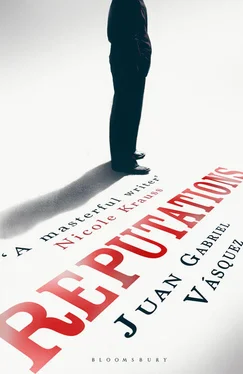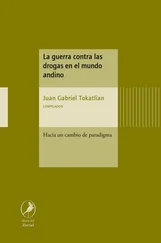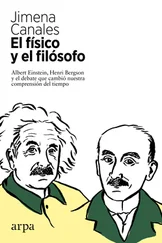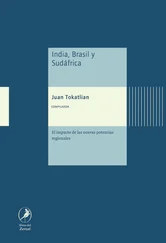‘None for you,’ said Mallarino. ‘But it might do her some good.’
Silence.
‘To hell with you, Javier,’ said Valencia. ‘To hell with you both.’
And he hung up.
So what he could have found out in twenty minutes he ended up finding out in two hours: Mallarino had to get out his yellowing address book that was falling apart, poor mangy little thing, and call a court reporter and some journalists at other papers — the national, news and police desks — and even a Member of Congress who owed him several favours. In a few minutes they were calling him back, each and every one of them, bending over backwards to meet Javier Mallarino’s immediate needs. His name helped, he had to admit it, but he was not the least bit concerned about abusing his reputation to achieve these modest ends, for, after all, were not these journalists and politicians the ones who had given him this reputation and the power that went with it? One thing for sure, Mallarino would have got the information much more quickly if the people he asked had been in possession of that information. But they weren’t: some of them had a hard time remembering Cuéllar; others didn’t even know he’d ever existed. Valencia was right: the man had been swallowed up by oblivion. Not surprising in this amnesiac country obsessed with the present, this narcissistic country where not even the dead are capable of burying their dead. Forgetfulness was the only democratic thing in Colombia: it covered them all, the good and the bad, the murderers and the heroes, like the snow in the James Joyce story, falling upon all of them alike. Right now there were people all over Colombia working hard to have certain things forgotten — small or big crimes or embezzlements or tortuous lies — and Mallarino could bet that all of them, without exception, would be successful in their endeavour. Ricardo Rendón had also been forgotten. Not even he had managed to be saved. Maybe Rodrigo Valencia had also been right about that: it was no use. What good would it do? he’d asked, and he meant something else, of course, but he’d managed to get Mallarino to retain the question and ask himself now, with some melancholy: what good would it do?
And now his four-by-four was entering the city, and the mountain road turned gradually into a suburban road and then the avenue, and the rain clouds seemed to pass them going the other way, stubbornly returning to where they’d come from: the house in the mountains. Mallarino detested this stretch where one found oneself suddenly surrounded by horrendous brick buildings, the temperature went up two or three degrees and drivers, who didn’t expect the change, began, in risky manoeuvres, to take their jackets off while driving. He had never had to take his jacket off: unlike most of the rest of the people who lived in the mountains, who left their houses all wrapped up in overcoats and scarves (and it was not unusual to see someone driving in leather gloves), Mallarino tended to dress in light clothes, no more than a shirt and corduroy blazer which changed colour when he brushed it with his hand, and preferred to leave his raincoat on the back seat of the car, ready for any eventuality. Samanta Leal, sitting beside him, had complained of the cold and ducked her head between her shoulders, like a chick, and had only recently started to relax. The sheet with the information was a tube of coiled paper; the woman’s hands gripped the tube as if she were pushing a lawnmower. Mallarino looked at them out of the corner of his eye, looked at the white knuckles and the delicate ring that was their only adornment, and then looked at Samanta’s profile, the strong angle of her jaw, the shoulders of an attentive student pressed against the back of the seat, the seat belt that crossed between her breasts like a hunter’s quiver. There, in the roll of paper, were the address and telephone number of Carmenza de Torres, who once was the wife of Adolfo Cuéllar and the mother of his sons and then his widow; Carmenza de Torres, who found herself obliged, after the death of her husband the congressman, to complete her studies in hostelry and tourism, which she’d given up at the time of her first pregnancy, and eventually ended up working at a travel agency, distinguishing herself in sales, becoming the owner’s personal assistant, marrying him and starting a new life with a new surname: a clean surname, a surname without memories. All this Mallarino found out with the help of his admirers. He also found out that the agency was called Unicorn Travel, and that the office was located across from the Parque Nacional and that Doña Carmenza went there every afternoon, from two till six, but never in the mornings (‘ Every afternoon?’ Mallarino asked; ‘Yes, every afternoon,’ he was assured). Now, driving towards the ring road at forty kilometres an hour, Mallarino outlined the day’s itinerary for Samanta. He’d drop her off at her house so she could rest a little and change her clothes; he’d keep an appointment he had in the centre; they’d meet at the travel agency at three o’clock. Did that seem good to Samanta? She, staring straight ahead, nodded the way a condemned prisoner might nod.
An appointment in the centre . What would Magdalena be doing right now? He suddenly felt an urgent need to see her, to be with her and hear her voice, as if by doing so he could prove in some twisted way that not all of the past was changeable and unstable. Magdalena was also the past. But Magdalena was firm. Mallarino imagined her, by some sort of automatism, in front of a double microphone, two long silvery tubes. The desk in the image was made of wood and covered in a brown cloth; on top of the cloth was a stopwatch, so Magdalena could time her monologues without consulting the digital clock on the wall. But all this was mere speculation: he wasn’t even sure that Magdalena recorded her programmes in the morning. On the avenue, the traffic was moving slowly, more slowly than normal. The four-by-four passed between unfinished rust-coloured buildings and urban trees, those sad trees with their crowns that nobody ever sees and their asphyxiated leaves on the lower branches. Samanta had given directions and proposed the best routes, drawing a map with words that Mallarino could imagine in his head, and then she had gone quiet, as if hoping that the silence would be strong enough to make Mallarino forget her presence. ‘Where should I turn off?’ he asked. Her hand moved in front of the windscreen, like the incomplete shadow of a little dove, but not a word came from her mouth; and when he turned his head, trying all the time to keep an eye on the traffic, Mallarino realized that Samanta had started to cry. They were stealthy and weary tears, like those of someone who has already cried a lot: these were remainders, leftover tears. ‘Don’t cry, Samanta,’ he said; he felt immediately, irrevocably stupid; but searching through the archives of his head he could not find any other consoling words. He didn’t have very many, either, and he didn’t often use them. And he felt immediately, irrevocably stupid.
‘I’m sorry,’ said Samanta. She smiled, wiped both eyes with the same hand, smiled again. ‘It’s just that I was fine. I didn’t need this.’
‘I know,’ said Mallarino.
‘Can I ask you something?’
‘Ask away.’
‘What happens now?’
‘What do you mean?’
‘Well, just that: what happens now? Or rather: what’s going to happen this afternoon? What’s going to happen after three? Am I obliged to carry on as before? I don’t know what I’m going to be told, but, do I have that obligation? And what if I decide I don’t want to, that I don’t want any of this? Right now, here, before we get to my house. What happens if I’d rather forget all this again? What if I’d rather go back to how things were before that fucking ceremony? Don’t I have that right?’
Читать дальше












